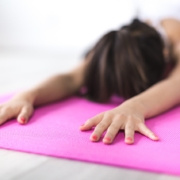Self Care for Yoga Teachers: 6 Practices to Help You Stay Nourished & Inspired
Teaching is a giving profession. And for those of you who teach yoga you know that we are often giving, and holding space for others, on multiple levels of being. Our students come to us for guidance on their physical practice, as well as to receive support in creating spaciousness and peace in their lives. Many students also come to class hoping to be uplifted and inspired, and in order to offer them that we must also be lit up and inspired.
So what happens when you, the teacher, are burnt out? How can you hold the quality of space you intend to when you are operating on an empty tank? How do you manage to stay inspired, engaged, and attentive when you are running around teaching 10-20 classes per week? Or trying to fit teaching into an already overcrowded schedule that includes a full time job and maybe even parenting too?
Yoga teacher burnout is not talked about in public much, perhaps because we tend to operate on the idea that the yoga teacher should be so filled up with Love & Light that they need little else? Or that our Prana rich diet should be giving us boundless energy? Or that the reduction of our negative Karma means we should no longer be falling prey to the kind of exhaustion lesser mortals are plagued with? Now while I am being sarcastic here, I do want to address the fact that many of us do take on some of these ideas at a subtle level and so may see our fatigue as some kind of personal failing, or a deficiency in our practice, rather than calling it what it is – simple depletion. And when you combine that with the very noble intention of wanting to be of service and to share the practices we love with as many people as possible, we can quickly find ourselves giving more than we are capable of and putting our own self care on the back burner in order to say yes to one more thing.
I would like to put forth that those who are engaged in healing work such as life coaching, massage therapy, teaching yoga, or any number of other similar professions actually need to make a stronger commitment to self care in order to do their work well. I would also like to say that this commitment to self-care is in itself an ongoing practice that will need to be fluid and adaptable as the demands of both our personal lives and our careers shift. I myself must constantly pause and take stock of my own life in order to revise my self-care practices to suit my ever-changing situations.
I have been the part time teacher offering 3-6 classes per week while also doing night shifts in a restaurant; I have been the single mom trying to fit my morning practice in before getting my kid to daycare for 7am, and I have been the full time teacher running from class to class at all hours of the day. I have been the teacher trainer who must operate at a high level of concentration for weeks in a row, the retreat teacher who must be available in and out of the classroom, and the traveling teacher who must combat the fatigue of being on the road and sleeping in hotels while showing up fully in new communities. And so this article is not meant to be another list of things that you “should do” or feel obligated to add to your already full to do list. It is meant instead to be an offering of the six most essential practices that I strive to maintain in order to nourish myself so that I may give fully and continue to grow on this path as both a teacher and a student.
#1: Start & End Your Day with Intention
As yoga teachers we know that the way we begin and end our classes really matters. And yet how often do we forget to apply that same wisdom to the way in which we move through our daily lives? A key practice for me, one that I consider non-negotiable, is to have a short practice that both begins and ends my day. For myself this is not asana based at all, rather it includes lighting a candle, doing some mantra and/or breathwork, sitting in meditation for 5-20 minutes, and maybe resting in Savasana for a few moments.
This practice is more about taking the time to connect to my deepest intentions as a practitioner of yoga and a student of life. I want to be grounded in this before I head into the classroom to teach, answer my first emails, or spending the day with my family. Taking the time to start my day like this changes everything, and yet when life is busy I can still find myself making excuses for why I can’t fit it in! And so because of this I actually measure my commitment to a life of practice by my consistency with this morning ritual rather than by how many yoga classes I go to in a week or how many hours I spend on my mat.
Ending my day with a similar practice helps me to create space between the activity of the day and the time of rest. Doing this is especially important when I am very busy and my mind is full, or when I have come out of more highly charged teaching environments such as a training or workshop. It helps me to make peace with myself and the effort I put forth in the day, rather than going to bed while still reviewing what wasn’t done or what I wish I had done better.
- Practice Challenge: craft a morning and evening ritual that can be done in 10-30 minutes max. and that will nourish you. It may include some simple movement, mantra, pranayama, meditation or prayer. Make it yours and commit to doing it for one moon cycle (I like new moon to new moon). Observe how this commitment to daily practice supports you.
# 2 Create Boundaries with Social Media & Email
Social media is part of most of our lives, and certainly as a yoga teacher it may be one of the key ways you communicate with your community at large. I get messages from students on a daily basis, coming in via Facebook & Instagram as well as my inbox, and it can be a lot to manage. I strive to respond to messages in a timely manner and have always prided myself on this, but honestly it gets harder and harder to do and as it starts to cut into the rest of my life I have had to put strict boundaries around media time and set hours for doing emails, otherwise I can’t get anything else done and my energy becomes very dispersed. From an Ayurvedic perspective being constantly available and dealing with multiple interruptions to other activities can greatly provoke Vata Dosha leading to increased anxiety and exhaustion. Sound familiar? Below are some strategies I am working with currently and which you might try.
- Turn off all notification sounds and alerts so that you are not distracted every time a message comes in.
- Discipline yourself to check emails or media messages at set times of day when you can focus on responding. The latest statistic I heard was that the average adult now checks their phone up to 85 times per day! Let’s try to bring that number down to something that is actually sustainable and not so crazy making.
- Consider taking email and social media off your phone entirely and keep it to your office hours. Or if you are on the road a lot like myself and that is not a practical solution, at least set it so you only receive messages when connected to Wi-Fi and so are more likely in a place where you can focus and respond.
- Pre schedule your social media posts (something you can do with an FB page, so that your posts for the week can be done in one sitting rather than crafting them each day.
- Discipline yourself around which hours of your day are sacred and free from media entirely. I choose not to look at email until after my morning practice and do not do emails after dinner to signify my workday is done. This takes discipline when you work for yourself and want to respond to your students as soon as they ask a question, but again that is not sustainable.
#3 Get Enough Sleep
Whenever I have failed to meet my own intentions regarding the way I wanted to teach a class, or whenever I have lain awake beating myself up to the point of despair for something I wished I had done better, fatigue has been a major contributor. I don’t know about you but I want to do my absolute best every time I walk into the classroom (as unrealistic as that may actually be), and yet if I am overtired then I will fall far short of my own ability as a teacher. Being overtired also exaggerates emotions and makes us more prone to taking things personally or falling prey to horrible self-criticism (see point #6 below for ways to make self criticism constructive). Sleep debt and nervous system fatigue are a modern day plague and while the practices we discussed in points #1 & #2 can help greatly, renewing our effort to get better sleep is also very important. There is a lot of information out there these days on the value of good quality sleep but here are some key practices most sources agree on.
- Aim to be in bed before midnight each night. 10pm is ideal in the winter months.
- Remember the average adult needs 7-8 hours of quality sleep each night to function optimally and manage stress well. Some of you may need more! If you are recovering from burn out, are pregnant or nursing, or are dealing with a lot of chronic stress aim for 8-9 hours whenever you can.
- Sleep in full darkness to support optimal hormone balance. Get heavy curtains to block out street lights, get blinking lights and telephones out of your bedroom, and use an eye mask if needs be. Darkness is nourishing!
- Turn off all screens that glow 1 hour before bed so your nervous system can unwind and you can sleep deeply.
- Make your bedroom a calm and quiet place. No TV’s or telephone use! Bedrooms are for resting, reading and making love. That is all.
Practice Challenge: go to bed earlier for one week. Reclaim the bedroom as a sacred space and your evenings as a time for peace & quiet and see how this affects the way you show up in the classroom, and in your life.
#4 Eat Well
I know that I am not your Mom and that reminding you to go to bed and eat well hardly constitutes original advice, but I’m saying it anyway. And I am saying it because I have been part of the yoga community for a long time, and I have been a teacher for many years, and I know despite how much we give lip service to healthy eating we are often a very undernourished bunch. Too many yoga teachers run around fueled on a diet of green juices, smoothies, dark chocolate, and coffee/matcha/chai. Too many of us focus on eating “clean foods” without realizing that our primarily raw diet may not include the nutrient density needed to teach 12 yoga classes, have an active social life, and go to 6 vinyasa practices each week!
- Make sure you are keeping your blood sugar balanced by eating nutrient dense meals regularly.
- Eat enough fat and high quality protein (if you are vegan you will need to ensure you have more high quality snacks throughout the day)
- Ditch the sugar. Honestly it is poison and it gives you false energy.
- Limit caffeine. I love my morning coffee drink as much as anyone else, but take an honest look at how sustainable your schedule is if you need to drink coffee late every afternoon just to make it through your evening classes.
- Sit down to eat your meals and focus on eating when you are eating. Pay attention to how you nourish yourself.
#5 Revise Your Schedule Seasonally
I am forever striving to find greater balance in my life and each season often brings changes I must re-adjust to. At least twice a year I like to sit down and look at how well I’ve managed the dance between work & life in the last few months. This is a chance to look at what needs to be upgraded or released as I move into the next season. Certainly as I have had to adjust to commuting and traveling more for work it has demanded different things from me then when I lived two blocks away from the studio I taught at and helped manage. Here are things to look at to support you in maintaining balance in your own life.
- Commit to sitting down 1-2 times a year to look critically at your teaching schedule and assess what works and what doesn’t.
- Block out time for yearly sabbaticals & vacations as well as weekly self care (it’s called a day off!) ahead of time, or before you know it your schedule might be full of teaching events but it’s going to kill you to actually pull it off.
- Be willing to adjust your personal practice to balance out the other demands of your life. If you are intensely busy with work and teaching then expecting yourself to maintain a vigorous yoga practice on a daily basis might be causing harm. Maybe you can add in more gentle practices, go to fewer classes, or shorten home practice so that you are not risking injury or exhausting yourself trying to do it all? Remember that quality not quantity is key in regards to your practice.
- Take the time to envision what your ideal teaching schedule would look like and then strive for that, rather than simply saying yes to every invitation to teach.
#6 Use Creative Discontent In A Constructive Way
I take my teaching work very seriously, and I have no doubt you do too. Which means that you have also likely spent many hours beating yourself up for not meeting your own expectations, or cringing in self-hatred when remembering what you forgot to say, or what you wished you had said better, or what you wished you hadn’t said at all in class! We’ve all been there. Now while holding ourselves to a high bar can be key to continued growth, beating ourselves up or indulging in a fit of self pity is a waste of creative energy and time. All the practices above will support you in showing up as fully as possible each time you walk into the classroom, but despite your best intentions sometimes you will teach a bad class. It’s just the way it is. No matter how long you have been teaching sometimes we just can’t pull it off. Here are some practices I use to make this creative discontent valuable rather than self-destructive.
- Carve out some time by yourself after the class or event in which to review what happened. Review what you had intended to offer, where it went well, where you fell short and why. Ask yourself what you learned and what you can work on for next time (i.e. be better prepared, be better rested, understand my material better etc), create action steps for doing what needs to be done and then LET IT GO!
- Do not ask everyone and anyone for feedback. If you truly thought the class sucked then ask someone you know and trust to give you some constructive feedback- but first tell them what you were aiming to achieve and what your intention for the class was so they can base their feedback on that rather then simply giving you their personal opinion regarding what they liked and disliked. Personal opinion is only somewhat valuable and does not always reflect best what you actually need to work on.
- Do a ritual or clearing practice at the end of the day to make space around your discontent and disappointment. Here we are circling back to a key reason for meditating at days end. Don’t go to bed with all those emotions swirling around or you may find yourself awake at 3am reliving the class in your mind, or dealing with an anxiety attack because you forgot to teach Triangle on the left side. This is a colossal waste of vital energy.
- If you are consistently disappointed with your teaching then consider whether or not you are giving yourself enough time to practice teach or study or simply rest. Be honest with yourself and be willing to let something go in order to teach better. Again quality over quantity. Teaching one intentional yoga class per week may be a better choice than trying to teach three of them while also juggling your full time job and everything else in your life.
I hope this article has been helpful and please know that these are the practices I hold myself to and strive to maintain on a regular basis. Also please remember that just like you sometimes I do better in regards to maintaining balance and caring for myself, and sometimes I fail miserably. But even in my failure I strive to learn and to take that learning forward into something I can use to fuel my commitment to self-care and to this life of practice. From my heart to yours, may you find ways in which to thrive on your journey as both teacher and student.














